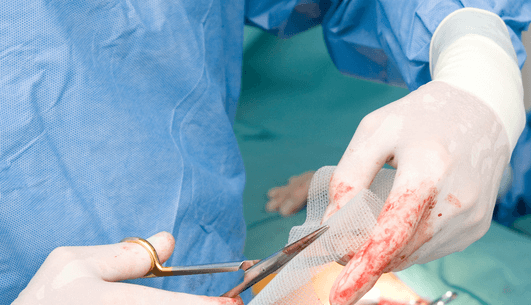Ventral hernia repair surgery improved over the last few years due to laparoscopic innovations, pain management improvements and better-designed devices. However, a recent flexible composite mesh (a popular hernia repair component) recall could negatively impact thousands now needing revision surgery. Some patients filed lawsuits even before Ethicon voluntarily recalled Physiomesh in May 2016 due to unusually high hernia recurrence rates. (Ethicon’s Physiomesh patches came in different shapes and sizes, including oval, round, square and rectangular designs.) Today, there are many safer alternatives to the once-popular Physiomesh flexible composite patch available for surgical repairs. The procedure itself is minimally invasive, and up to 10% of all abdominal surgery patients will eventually develop ventral hernias.
Related: Get Answers to Your Own Claim Questions
Suggested Alternatives for Replacing Faulty Mesh Implants
Ethicon’s Urgent Field Safety Notice listed several hernia mesh alternatives to Physiomesh suitable for use in future surgical repair procedures. For intraperitoneal/intra-abdominal mesh placement repairs, Ethicon recommends using Proceed™ surgical mesh. And for extraperitoneal mesh placement hernia repairs, Ethicon suggests using these flat patches:
- Prolene™ polypropylene mesh
- Prolene™ soft mesh
- Ultrapro™ mesh
- Ultrapro Advanced™ mesh
Since Ethicon didn’t conduct clinical trials before launching Physiomesh, affected patients might choose another company’s product for revision repairs. Fortunately, revision surgery candidates can choose from over 50 different mesh alternatives currently available for replacing defective Physiomesh patches. Manufacturers use materials ranging from plastics to gels, pig skins and much more to create these alternative mesh products. (To see all recommended alternatives available, click here.)
How Defective Hernia Mesh Can Harm You
When someone with defective hernia mesh experiences a recurrence, another surgical repair’s the only way to fix it. Plus, each subsequent repair attempt is significantly likely to be less successful than the previous surgery. All surgical procedures carry some risks, but ventral hernia patients are particularly susceptible to developing complications down the road. Every new abdominal incision site weakens the surrounding tissue. That means each attempt to repair the first hernia could result in an additional tear within the abdominal wall. Scar tissue building up over time may also contribute to additional complications involving the patient’s internal organs. Serial recurrence as well as defective hernia mesh may cause patients to develop life-altering health complications, including:
- Intestinal blockage
- Pain
- Infection
- Migration
- Adhesions (when scar tissue causes organs to bind or stick together)
- Formation of a mass/lump
- Vomiting/nausea
- Fever
- Redness
Surgical Repair Options That Don’t Include Hernia Mesh
There are a few surgical repair options that don’t involve using hernia mesh. And as hernia size increases, your surgeon’s more likely to insist on using a mesh patch to repair it. Depending on your hernia’s size and placement, ask your surgeon about these repair options that don’t involve using hernia mesh:
- Shouldice Repair. This time-tested method uses a two-layer suture to connects the patient’s fascia and inguinal ligament. It works well for repairing inguinal hernias (around 1% recurrence rate), but may not be viable for ventral repair procedures.
- Open Repair. After making a small incision, your surgeon pushes bulging tissue and organs back into place inside your abdominal cavity. Next, your surgeon uses sutures or a tissue flap to reconnect weakened muscle tissue, which covers the hernia site. Recovery time for open hernia repair is typically much longer than other options, such as laparoscopic incisional procedures.
While the options above are possible, many surgeons prefer using hernia mesh because it’s minimally invasive with faster recovery time. Unfortunately, using faulty hernia mesh can lead to serious complications that require more expensive and painful revision surgeries over time.
What You Can Do
If you or a loved one had repair surgery, you may qualify for compensation. To see if you may qualify for a cash settlement, get your free hernia mesh claim review online today. (Even if your surgeon used a different mesh patch, you could be affected, so the same form still applies.) After completing your review, an attorney will contact you to discuss how to get the justice and pay you deserve.
Related: Woman Needs Plastic Surgery for Hernia Repair Injuries
Mandy Voisin
Mandy Voisin is a freelance writer, blogger, and author of Girls of the Ocean and Star of Deliverance. As an accomplished content marketing consultant, mom of four and doctor's wife, Mandy has written hundreds of articles about dangerous drugs and medical devices, medical issues that impact disabled Americans, veterans' healthcare and workers' compensation issues since 2016.

